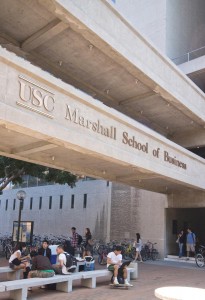Not your everyday business school
Most people attend business school to learn practical skills to help them succeed in the profession.
But at USC, finding new ways to succeed is just as important as learning the tried and true methods.
Marshall School of Business currently ranks No. 12 in the University of Texas Dallas’ Top 100 World Rankings of Business Schools based on research contributions 2006-2010, and No. 11 in UTD’s North American Rankings.
“The goal of what we do is to provide new knowledge,” said Deborah MacInnis, vice dean for research and strategy. “It’s not just about taking existing knowledge and applying it to a business or business situation.”
As expected, for research reports to get published in the top-tier academic journals, the research needs to yield cutting-edge, significant discoveries. It seems Marshall has had no problems with this, as its faculty research results have been picked up by CNN, Fox News, Forbes, Business Week and the Wall Street Journal.
The money for Marshall research comes from a variety of sources: grants, resources from the school — which are limited — foundations and corporations that want to become more knowledgeable about certain things.
USC has been able to hold its own in the midst of that competition by attracting a stellar faculty with its resources.
“We’ve been able to hire faculty from Stanford, Wharton, Northwestern, Harvard and other top schools around the country,” MacInnis said. “Our research environment and the resources we have really draw people here.”
Some of those resources include presentations, funding opportunities, and Center for Excellence in Research workshops that provide training and forums on how to write persuasive proposals, how to assess federal research opportunities and how to develop funded research programs among other topics. USC is also working on a new software system which will simplify all aspects of research administration.
These resources primarily assist faculty members and graduate students, who do the majority of the research at Marshall.
“Students can do undergraduate work with faculty members, but right now the research is based on an independent study basis,” MacInnis said.
Because Marshall has seven different academic areas, a very diverse faculty and no wish to stifle research creativity, it’s difficult to give a general overview of everything currently being researched.
“We don’t as a school direct our faculty to do certain kinds of research. Our faculty does the research that they’re passionate about,” MacInnis said.
What people might find most relatable, however, is the research done in marketing that focuses on consumer behavior.
A recent study focusing on the strength of brand attachment and its results was published by MacInnis, C. Whan Park, professor of marketing, and Joseph Priester, associate professor of marketing. The study found that people develop emotional bonds with brands like Apple, and are willing to spend more money and go out of their way to acquire them.
Marshall also has multiple Centers of Excellence that focus on specific components of business, such as entrepreneurship, investment, innovation and branding research.
The Center for Global Innovation, for example, focuses on market data and studies the nature of consumers, businesses and nations. The Center is currently researching subjects like predicting takeoff and sales of new products, how technologies evolve, designing new products from web chatter and whether or not firms should make or buy innovations.
There is also research on what makes advertisements successful as well as on investment decisions, the impact of the external environment on business and vice versa. Other projects include figuring out how to design a machine that can bargain successfully with people.
“All of us believe that we are students for life. We are never done. We are constantly learning and constantly trying to see what coming next,” MacInnis said.

